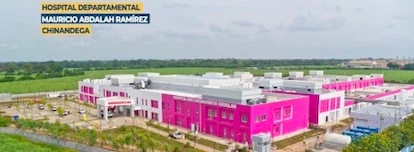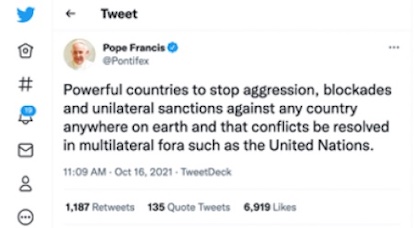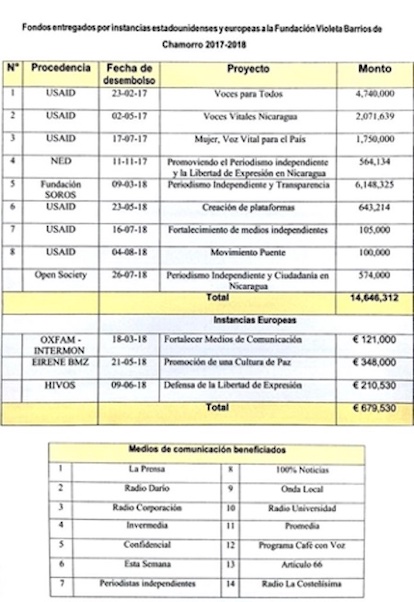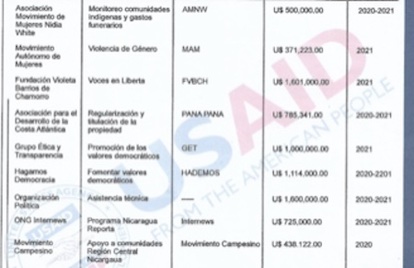| Nicaraguans Will Not Let the Evil Empire Dictate Who They Vote For, with Sandinista Revolutionary leader Daniel Ortega Poised to Return to Power The Sandinista party won with 62% of the vote in the 2011 elections and with 72.5% in 2016. Polls show the Sandinista party winning with between 64% and 75% in the November 7 elections, during which more than 3 million people will vote for President and Vice President, 90 National Assembly representatives and 20 Central American Parliament representatives. The likely reason for such a majority vote for the Sandinista party is that people want the progress their families have experienced since 2007, like universal free health care and education, to continue; Nicaragua has made the greatest investments in infrastructure, including new modern health facilities and road networks, in the Central American region.
Since 2007, poverty has been cut in half, maternal mortality has dropped by 70%, infant mortality by 61% with a 66% reduction in chronic malnutrition in children 6 to 12 years old. With a high percentage of small and medium-scale farmers and significant government investment in training and local food-production programs, Nicaragua has achieved 90% food sovereignty. In the last 14 years potable water access has risen from 65% to 92%; electricity coverage has increased from 54% to 99% and 80% of the energy comes from renewables; in fact Nicaragua is number three in the world in renewable energy. In gender equality Nicaragua has gone from 62nd to 5th in the world; and it holds first place in the world for women’s health and survival, women’s educational attainment and women cabinet ministers. The satisfaction of the population with public services, Nicaragua’s transparency, lack of corruption and good project execution is even recognized by international banks. The U.S. strategy in the 2021 elections is to declare the elections illegitimate even before they take place. The U.S. has intervened in every election since Nicaragua’s first free and fair election which took place in 1984. That year, the U.S. used the Contra War and the U.S. economic blockade to twist the arm of the population. But when polls showed the Sandinista Party winning by a large margin, they told “their” candidate, Arturo Cruz, to drop out and say he was not participating because the elections were not going to be free and fair. RAIN: a CIA regime change plan A United States Agency for International Development (USAID) regime change document was leaked to independent Nicaraguan journalist, William Grigsby in July of 2020 from the U.S. embassy. RAIN, or Responsive Assistance in Nicaragua (RFTOP No: 72052420R00004) is a Terms of Reference contract for hiring a company to oversee what it refers to as a “transition” – a word used more than thirty times in the document. It was written in the spring of 2020 and much of the U.S. destabilization activity to try to get the Sandinistas out of power has likely been under this plan. “The purpose of this activity is to provide rapid responsive … assistance to create the conditions for, and support, a peaceful transition to democracy in Nicaragua [regime change].”“RAIN will contribute to the Mission’s … objective of enabling the environment for Nicaragua’s transition to democracy.”U.S. actions to isolate Nicaragua On September 24th at the United Nations, U.S. Secretary of State Anthony Blinken met with the presidents of Mexico and all Central American countries except for Nicaragua and gave them the order to isolate Nicaragua. It is very unlikely that this will happen, despite all of these countries behaving in a relatively subservient way to the U.S. The economic relations between Central American countries are very powerful and commerce between them is strong. Attempting to blockade Nicaragua would be difficult given that Central America is an isthmus and Nicaragua is right in the middle. Not to mention that because Central American countries and Mexico already face a lot of problems, they likely do not want a problem with Nicaragua. They have generally good relations with Nicaragua, who is very respectful of other countries. The Sandinista National Liberation Front (FSLN) has always wanted to achieve the integration of Central America. Sanctions: another form of war The U.S. first considered sanctions on Cuba in 1960 when Deputy Assistant Secretary of State Lester Mallory said that the purpose of a blockade on Cuba was to “bring about hunger, desperation and overthrow of government.” In the 1980s, in an attempt to overthrow the revolutionary Sandinista government that had taken power in 1979, the US funded counter-revolutionary forces against Nicaragua and declared an embargo on all trade with the country. In 2018, the U.S. passed illegal unilateral coercive measures [sanctions] against Nicaragua. The Nicaragua Investment Conditionality Act (Nica Act)—which passed the House of Representatives with zero opposition by a 435-0 margin—directed the Executive Branch to “oppose new loans or agreements with Nicaragua through the World Bank, Inter-American Development Bank and the International Monetary Fund; and directs agencies to create a ‘civil society’ engagement strategy [fund and support opposition groups], among other actions.” The Nica Act was to punish Nicaragua for not being a subservient colony; it is not based on any wrong-doing. For example the multilateral lenders only praise Nicaragua for its transparency and efficiency in project execution, going so far as to specifically say it is not corrupt. The Nica Act reduced multilateral loans hurting development in Nicaragua as well as impacting healthcare during the pandemic. With damage from two strong hurricanes in November 2020 and Covid-19 some of the institutions have provided loans. A number of members of the government have been sanctioned as individuals, like Paul Oquist, Minister for National Policies, who has since passed away. Oquist was an internationally recognized expert on climate change and co-chair of the Green Climate Fund in 2018. Born in the U.S., he gave up his U.S. citizenship in the 80’s in protest of the Contra War. On October 16 the Pope tweeted this about sanctions:
In order to punish Nicaragua further for having a growing economy, outdoing the other Central American nations in health care, education, infrastructure and all statistics related to poverty, and for having the lowest Covid death rate in the region, Congress is now on the verge of passing further sanctions called the RENACER Act. Activists lobbying against this bill learned from Congressional Aids that members of Congress have received significant pressure from the U.S. government through USAID, Freedom House, the National Endowment for Democracy and others. The RENACER Act (Reinforcing Nicaragua’s Adherence to Conditions for Electoral Reform) is a form of coercion to try to get Nicaraguans to vote against the Sandinista government. Nicaraguans know what sanctions mean for their economy. RENACER would make development financing even more difficult to get and could possibly make the economy scream. The bill has passed the Senate and will likely go up before the House soon. The bill would already have passed without a formal vote, like the Nica Act, if it weren’t for impressive lobbying efforts by constituent friends of Nicaragua. The RENACER ACT applies targeted sanctions to card-carrying Sandinista members, some 2.1 million people, a third of the population. Included in the stated reasons for attacking Nicaragua with RENACER are two laws that Nicaragua passed in October 2020: the Foreign Agents Regulatory Law—similar but not as stringent as the US FARA law, and the Cybercrimes Law, also not nearly as punitive as U.S. cybercrimes laws. Astounding considering that the US has the same laws! U.S. funding of propaganda The U.S. Agency for International Development (USAID) provided US$234 million to Nicaraguan civil society from 2015 to 2121; and with the National Endowment for Democracy (NED), the International Republican Institute (IRI), the National Democratic Institute for International Affairs (NDI) and others, the U.S. gave well more than US$300 million openly to their Nicaraguan operatives and the nongovernment organizations they manage. Below is some of the funding for media outlets that stirred up anti-Sandinista hatred and distrust of the government, in favor of the 2018 U.S.-directed coup attempt. The media created and/or funded included slick websites, online magazines, social media, radio, tv and syndicated shows and the only newspaper that existed at the time, rabidly anti-Sandinista.
In 2007 when the Sandinista Party returned to the presidency, U.S. agencies began providing funds to create media, including web-based outlets and social media pages to invent and spread lies, fake news and disinformation to influence both Nicaraguans and the international audience. The U.S.-funded fake news outlets are the sources used by the U.S. mainstream media. Your tax dollars fund propaganda in Nicaragua that you then read in your local paper. U.S. Money to influence the November 2021 elections Much of the U.S. money for media was channeled through the Violeta Barrios de Chamorro Foundation, run by Cristiana Chamorro, daughter of former president Violeta Barrios de Chamorro (who was handpicked by the U.S. to be the 1990 candidate to oppose the Sandinistas). In the lead-up to the current elections USAID provided the Foundation with U.S. $998,958 in 2020 and U.S. $1.601 million in 2020-2021. Part of that money is reflected below together with funding for other NGO’s.
After Nicaragua passed laws to keep foreign money out of Nicaraguan politics in the fall of 2020, Chamorro shut down the foundation in February 2021 in order not to comply with the Foreign Agents Law which requires nonprofits to provide information on foreign funds received and evidence of how the funds were used. According to Nicaraguan journalist William Grigsby and former Contra leader turned news analyst, Enrique Quiñones, Chamorro transferred some US$7 million to her personal accounts. Chamorro has been under house arrest since June 2nd, and along with nine others associated with the Foundation including her brother Pedro Joaquin, is accused of money laundering, abusive management of funds, misappropriation and other crimes. The newspaper La Prensa and a number of its executives are also being investigated for fraud and money laundering. It is interesting to note that important USAID partners like the VBCF used to be listed on the website; and just in the last year the information has been redacted. The Nicaraguan Public Ministry has accused or is investigating more than 30 people for crimes like fraud, money laundering, conspiracy, and treason. Many of those accused of conspiracy, treason and other crimes were involved in the 2018 coup attempt. However, they are not being investigated for that involvement because in June 2019 the government gave amnesty to everyone involved in the coup attempt. The current accusations are for requesting sanctions and other forms of war from a foreign country and for taking part in a new coup attempt. The Nicaraguan Public Ministry Document of Accusations describes some of the crimes “The crimes consisted of triangulating funds from US institutions like the International Republican Institute (IRI), the National Endowment for Democracy (NED) and the United States Agency for International Development (USAID) in order to create organizations, associations and foundations that would channel resources to other organizations, projects, programs and people.”Since these investigations began in June the U.S. media has fallen into line accusing Nicaragua of wrong-doing. Their headlines stated that Nicaragua was jailing presidential precandidates and disqualifying any opposition parties to ensure that the Sandinistas would win. First of all the polls show the Sandinistas winning with anywhere from 64% to 75% of the vote. Secondly the five people the media say were precandidates were not even members of a party. Under Electoral Law parties do not officially inscribe candidates until the month of August and there is no such thing as a pre-candidate. In any case, along with an Alliance that includes the FSLN and eight other legal parties, six more parties are running, many more than in any election in the US. The government provides campaign funds to the parties. All but one of the parties with representatives in the National Assembly are running. And the party that won second place in 2016, the Liberal Constitutionalist Party (PLC) is running. Influencing Nicaraguan voters through Covid-19 scare tactics The U.S.-directed media in Nicaragua and its echo-chamber in the international press have carried out health terrorism since Covid-19 began, asserting that many more people are sick and dying than is the case. This is part of the media distortion described above. Unfortunately due to these lies, as Covid-19 was beginning, some people didn’t go to the hospital for fear of getting sicker like the U.S.-backed media purported. And some of these people died. Nicaragua spends a fifth of its budget on health care and has invested millions in new infrastructure and equipment, including 22 new hospitals! Nicaragua has had far fewer cases per capita than any country in the Americas: The Institute for Health Metrics and Evaluation (IHME) which calculates excess deaths worldwide shows 268 deaths for Nicaragua, 7,521 for Costa Rica and 10,760 for Honduras. Despite having the lowest Covid mortality rate in the Americas, the U.S. embassy lists Nicaragua as a level 4—do not travel country, whereas Honduras, much more dangerous for Covid-19 or simply for murder and violence, is listed as Level 3. The U.S. also practices vaccine diplomacy: it has given vaccines to all of the Central American nations—except Nicaragua. Although Nicaragua has been vaccinating since March, only in October did it get larger quantities of vaccines from Spain, Russia, India and the COVAX Mechanism, vaccinating the population from age 30 up. The U.S.-backed media says people are fleeing political persecution The U.S.-backed media says people are fleeing political persecution. This is another lie the U.S. has ramped up for the elections. According to the Department of Homeland Security between 2015 and 2018 the yearly average number of Nicaraguans apprehended at the border was 2292, very small compared to Hondurans at 63,741. U.S. Border Patrol has encountered more Nicaraguans in 2021 (33,000), but still low compared to Hondurans (218,000) and Salvadorans (73,000). Tom Ricker of the Quixote Center says the push factors include Covid-affected economies for all the migrants, wrecked tourism, which provided substantial employment in Nicaragua; destruction of crops by two major hurricanes in 2020 affecting Guatemala, Honduras and Nicaragua; and the 2018 sanctions of the Nica Act along with the threat of more sanctions. Prior to Covid-19 there were seasonal jobs in Costa Rica, but now there are more people returning to Nicaragua. Honduras and U.S. Double Standards Honduras will also have elections in November, but the U.S. is not trying to oust the government even though its president, Juan Orlando Hernandez, blatantly rigged elections, stole millions from Honduran social services, and has been accused of protecting drug traffickers and helping to flood the US with cocaine. W.T. Whitney Jr. wrote in People’s World: Honduras’s poverty rate is 70% … Violence at the hands of criminal gangs, narcotraffickers, and the police is pervasive and usually goes unpunished. According to insightcrime.org, Honduras was Latin America’s third most violent country in 2019 and a year later it registered the region’s third highest murder rate … Honduras, followed by Guatemala and Mexico, registered the highest rate of emigration to wherever between 1990 and 2020 …What will the impact be on Nicaragua’s elections? The U.S. government has been extremely successful in terms of getting the press, in chorus, to denigrate Nicaragua’s Sandinista government for being a “dictatorship.” It’s been even more successful at keeping all the good news of Nicaragua’s amazing social and economic advances out of the U.S. press. If you only read mainstream sources you would have no idea that Nicaragua is the safest most secure and highly functional country in the region. The government of Nicaragua reaffirmed at the United Nations General Assembly that in the November 7 elections it is not the U.S. Empire that will choose but the Nicaraguan people. During his UN speech, Foreign Minister Denis Moncada reaffirmed Nicaragua’s commitment to continue working for peace, security and tranquility of individuals, families and communities. Statistically, every aspect of life has improved under the Sandinistas and the intention to vote Sandinista has increased monthly in the polls. It appears that U.S. sanctions, coercion, and disinformation will have little effect on how Nicaraguans vote. Source URL |



